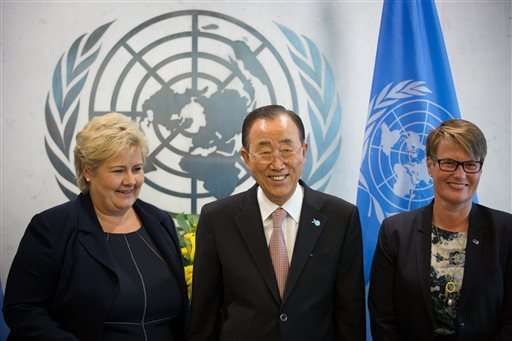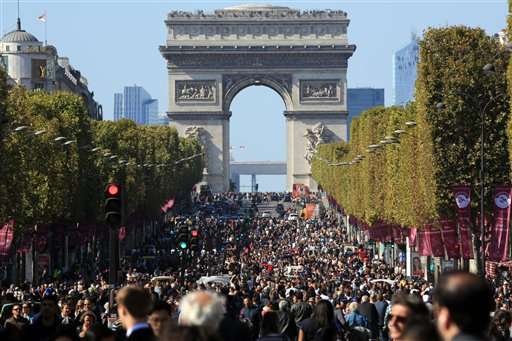Despite pledges, climate action seen falling short

The emissions pledges that countries have made ahead of a landmark conference in Paris have been a major boost to the slow-moving U.N. effort to fight climate change.
Less so for the climate itself.
With pledges to cut or curb greenhouse gas pollution on the table from all major countries except India, researchers say the world is on track for more than 2 degrees C (4 F) of warming this century.
That's a level that scientists say could result in profound and irreversible impacts on the climate system, including flooding of coastal cities and island nations, disruptions to agriculture and drinking water, and the spread of diseases and the extinction of species.
However, climate experts say that it's not game over yet, as long as the Paris agreement includes ways to step up the pace of emissions cuts over time.
"Much of the underlying motivation for any emissions reduction agenda is that first steps lead to second steps, which lead to third steps. It is probably the case that first steps won't solve the problem, but they start the journey," said Chris Field, a candidate to become the next chair of the Intergovernmental Panel on Climate Change.
An analysis presented Monday by Climate Interactive, a Washington-based climate research group, found the emissions targets presented by China, the U.S., the European Union, Brazil and other governments before the December conference in Paris leave the world on a path toward 3.5 degrees C (6.3 F) of warming compared with pre-industrial times. Temperatures have already warmed nearly 0.9 degrees C (1.6 F) from pre-industrial times to now, primarily because of emissions from the burning of coal, oil and gas, scientists say.
That means warming would be 1 C (1.8 F) lower than what would happen if governments did nothing, said Andrew Jones, co-founder of Climate Interactive, but well above the international goal of keeping warming below 2 degrees C (3.6 ), which is 1.1 degrees C (2 degrees F) from now.

Another analysis, by the European-based Climate Action Tracker, projects the world is on a path toward about 3 C (5.4 F) of warming. The difference is mainly due to guesswork on what happens after 2030, the end date for the current pledges.
Niklas Hoehne, a researcher involved with Climate Action Tracker, said it's still possible to limit warming to 2 degrees C if global emissions peak after 2030 as long as they drop quickly after that.
"The question is whether it's a politically feasible pathway or not. That's a value judgment," he said.
Given the glacial pace of the U.N. climate talks in the past, the fact that just about all countries, rich and poor, are finally committing to do something about climate change is encouraging in itself, analysts say.
A diplomatic solution seemed far away after a hyped 2009 summit in Copenhagen ended with a weak, voluntary agreement that pushed a more ambitious deal down the road.
In Paris, the prospects of that deal coming together appear much greater, with all major emitters putting down emissions targets in advance. India is expected to do so this week, as the last of the top 10 greenhouse gas emitters.
Still, it's unclear whether the deal will include the tools to bend the emissions curves in the future enough to avoid dangerous levels of warming.
Scientific models show that to stay below 2 degrees the world can emit no more than 1 trillion tons of carbon dioxide, a key global warming gas released when oil, coal and gas are burned for energy. At the current rate of emissions, that "carbon budget" will have been spent in three decades.
But instead of figuring out ways to divide that budget in a way that reflects each nation's historical responsibility for the problem, level of development and other factors, each country is self-determining the size of its share. That's because countries cannot agree on what's a fair distribution.
"When every country's definition of fair and ambitious uses different metrics you won't easily get to a situation where you divide the carbon budget," said Kelly Levin, of the World Resources Institute, an environmental think tank.
Even though they they're not enough by themselves, many experts are optimistic that the pledges presented so far will lead to even greater emissions reductions going forward and ultimately a major shift toward a low-carbon energy system, with a much greater share of renewable energy sources such as wind and solar power.
It remains unclear, though, whether governments will ramp up their emissions cuts before the carbon budget runs out. While emissions have started to fall in developed countries, they are still rising fast in China and other fast-growing developing nations.
Last week, Indian Environment Minister Prakash Javadekar told The Associated Press that any international deal must allow India's emissions to grow as it expands its economy and fights poverty. He said that means richer countries that have polluted the atmosphere for much longer should make bigger cuts to their own emissions.
"We are asking the developed world to vacate the carbon space to accommodate us," Javadekar said. "It is our right as a nation. It's our right as people of India, and we want that carbon space."
© 2015 The Associated Press. All rights reserved.



















